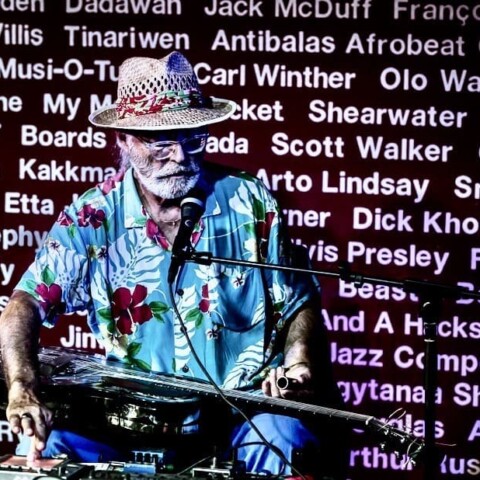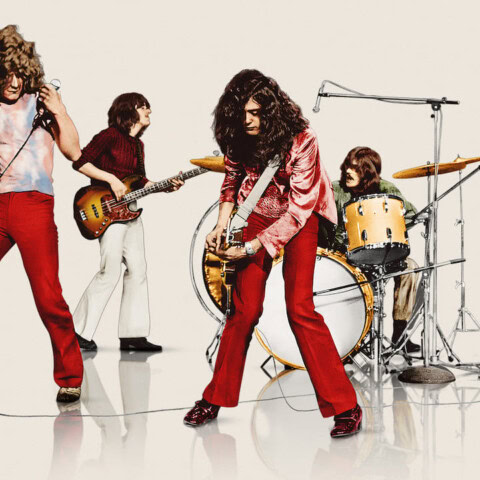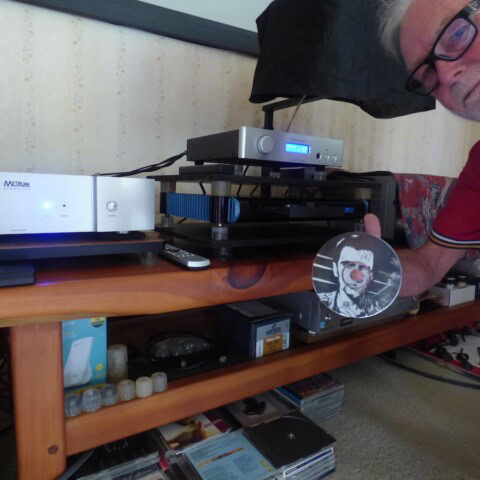In honour of NZ Music Month, Gary Steel climbs into the crumbling catacombs of his back catalogue, and disinters a different story Every Day In May (EDIM). Today’s piece appeared in the Times on 13 March, 1983.
“When you see shows like the Sex Pistols and some of those groups who are actually chopping chickens’ heads off on stage and blood and guts all over he place… your mind’s inclined to boggle.”
 PATSY RIGGIR’S SURE no snob.
PATSY RIGGIR’S SURE no snob.
“I cannot see anything degrading being classed has hick”, she says with disarming honesty.
She bursts into laughter with the realization of what she has just said.
Continuing: “I can mix with sophisticated people in their cocktail gowns or I can sit on the floor and have a beer with a farmer in his woolshed. It’s all part of life.”
This determinedly anti-snob attitude will continue to win the hearts of the average New Zealander, as it has been doing already for the 37-year-old Putararu-based country singer.
She says: “I know there are some country artists who don’t like to be classed as country and western. They seem to think there is some sort of stigma in being like an old-fashioned – overalls, off the turnips – sort of attitude.
“But that doesn’t bother me. I mean I sneaked over the neighbours’ fence in the dead of night when I was a kid and nicked their turnips! So I don’t mind being classed as ‘off the turnips’ in the least!”
Us city slickers can laugh all we want at country music’s slushier moments. As Patsy could tell you, it’s country music that will have the last laugh. Country music is undergoing a massive revival. Patsy herself can testify to this, as her last album Lay Down Beside Me has reached platinum sales status.
And, as many a disillusioned local yokel could tell you, for a homegrown album to reach this mark is just short of a phenomenon. Country music is infiltrating the pop charts with a vengeance.
Tell us why, Patsy.

“Well… I guess everybody’s got their own theories. For my part… I think the world today is geared so fast and things are going so hectic that – country music is a very easy and laid back type of music. And when people come home from work and they’ve had a hundred hassles and their head’s thumping, uptight and tense – I feel that country music is the sort of music that they’re putting their feet up with a cup of coffee, listening and unwinding.”
I express doubts about the more conservative elements of country music. It seems to go out of its way to uphold traditional values.
“Well… maybe it’s a way of hanging on to your ideals,” she says. “When you see shows like the Sex Pistols and some of those groups who are actually chopping chickens’ heads off on stage and blood and guts all over he place and this kind of thing… I think it makes people more aware of hanging onto something that’s decent.”
“It’s getting back to a more conservative form of music, because when you start to think about it, your mind’s inclined to boggle if this kind of thing is happening on stage. Where can that lead to? Where can they go?
“Hell’s teeth! It does make you feel a wee bit sick in the stomach – music should be entertainment. I’m not biased. I’ve got a pretty open mind. I like all kinds of music. But that type of music? If that’s the type of thing you’ve got to sell your music with then I wouldn’t want any part of it.”
Country music’s inherent conservatism has much to di with its modern breeding ground: commercial country music centre, Nashville USA. Patsy caught a glimpse of it herself in 1982 when she visited Nashville, guesting at the famous Grand Ol’ Opry while there.
 “It’s very distinctly still racist in that there are streets where you don’t walk,” says Patsy. “You’re not allowed to step on a black bus. There have been years and years of bloodshed and that’s something you couldn’t wipe out overnight.”
“It’s very distinctly still racist in that there are streets where you don’t walk,” says Patsy. “You’re not allowed to step on a black bus. There have been years and years of bloodshed and that’s something you couldn’t wipe out overnight.”
She did, however, enjoy her visit: “I loved it. It’s a very old city, a very dirty city. The rubbish in the gutters was… amazing! Very dilapidated in many respects, and reeking with character.”
She takes delight in explaining that the primary industry in Nashville is printing, not music.
She says she “spent a lot of time tottering around the honky tonks, little wee dark places, the smoke is thick, and you find a little table in the corner. A lot of the musicians there make their living busking. They’ll hop up there (the stage) and play. Bands are playing there 24 hours a day. One musician will get tired and step down for a break and another will step up to take his place.
“Some of the musicians there were just incredible yet they are the ones who can’t make it. I saw a lot of musicians there who were as good if not better than those already in groups, but they just haven’t had that lucky break. Luck has got such a lot to do with it.
“I could have just filled up a jumbo jet and brought home all these musicians who I would just love to back me.”
Patsy herself enjoyed getting up and singing a few songs in these honky tonks.
Already this year her schedule is on overload, and stretches through into 1984. It includes the popular country TV show That’s Country (soon to be broadcast in America), trips to Australia and Nashville. And somewhere in there she has to find time to record another album. GARY STEEL
Notes: This is the story with which I discovered that I didn’t have to be a fan to enjoy interviewing or writing about the artist. But just reading it turns me a bright shade of shamed red: for having such a cursory understanding of country music at the time, and for such poor sentence construction. But in the interests of the truth, all things must pass!















